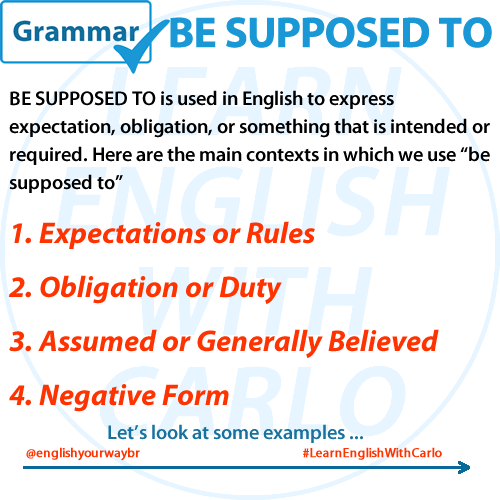English learners often encounter the phrase “be supposed to” in everyday conversations. It’s a common expression used to talk about expectations, obligations, rules, and assumptions. In this post, we’ll explore what “be supposed to” means, how it’s used, and the grammatical rules that guide its usage.

1. What Does “Be Supposed To” Mean?
“Be supposed to” is used to express what is expected, required, or assumed in a given situation. Whether you’re talking about rules, responsibilities, or common beliefs, this phrase helps convey those ideas. Here are the key contexts in which we use “be supposed to.”
2. Using “Be Supposed To” for Expectations and Rules
One of the most common uses of “be supposed to” is to indicate what is expected or required based on rules or norms. These can be formal rules, like laws or company policies, or informal expectations, like societal norms.
- Examples:
- You’re supposed to wear a uniform to work. (Expectation based on a rule.)
- We are supposed to bring our own materials to class. (Expectation based on a class rule.)
In both examples, there is a clear expectation or rule that the subject is required to follow.
3. Expressing Obligations or Duties
“Be supposed to” is often used to talk about duties or responsibilities. It indicates something you are required or expected to do, even if you might not always follow through with it.
- Examples:
- I’m supposed to clean my room every weekend. (Obligation)
- He’s supposed to finish the report by Friday. (Responsibility)
In these cases, there is a duty to perform, but it may or may not happen as expected.
4. Assumption or General Belief
“Be supposed to” can also refer to something that is generally believed or assumed to be true, though you might not have direct evidence for it. This use is more about perception than obligation.
- Examples:
- That movie is supposed to be really good. (General belief)
- She’s supposed to be an excellent chef. (Assumed fact)
This use highlights how “be supposed to” can communicate what people think or assume, even if the reality is different.
5. Prohibition or What Shouldn’t Be Done
When used in the negative form (“not supposed to”), it implies that something is prohibited or not allowed. It’s a softer way to say that something is forbidden.
- Examples:
- You’re not supposed to eat in the library. (Prohibited action)
- We’re not supposed to park here. (Breaking a rule if done)
This negative form is very useful in everyday speech to convey what isn’t permitted.
6. How “Be Supposed To” Works in a Sentence
“Be supposed to” follows a simple structure, but it changes based on the subject and tense:
- Present Tense: [Subject] + am/is/are + supposed to + [base verb].
- Example: She is supposed to finish her homework.
- Past Tense: [Subject] + was/were + supposed to + [base verb].
- Example: They were supposed to meet at 5 PM.
This structure can be used in various tenses, making it flexible for different time frames.
7. Polite Obligation
“Be supposed to” is often softer and more polite than using stronger modal verbs like “must” or “have to.” It expresses obligation or responsibility in a way that feels less strict or forceful.
- Examples:
- We’re supposed to leave at noon. (Softer than: We have to leave at noon.)
- You’re supposed to take your shoes off before entering the house. (Less forceful than: You must take your shoes off.)
This makes “be supposed to” a great choice for giving instructions or expressing duties without sounding too demanding.
8. Future Obligations and Expectations
“Be supposed to” can also refer to future expectations, especially when talking about scheduled or planned events. Even though it’s typically used in the present or past tense, it can hint at future obligations or scheduled activities.
- Examples:
- I’m supposed to attend a meeting tomorrow. (Future expectation)
- We’re supposed to go to the concert next week. (Scheduled plan)
This allows you to talk about upcoming plans in a way that shows expectation or responsibility.
9. Understanding Subject-Verb Agreement
Like many English phrases, the form of “be supposed to” must agree with the subject of the sentence. This means you need to change the verb “to be” (am, is, are, was, were) depending on whether the subject is singular or plural, and based on the tense you’re using.
- Examples:
- She is supposed to arrive at 6 PM. (Singular subject)
- They are supposed to finish the project by Friday. (Plural subject)
Getting this agreement right is crucial for making your sentence grammatically correct.
In Conclusion
“Be supposed to” is an essential phrase in English, offering a polite, flexible, and often indirect way to talk about obligations, expectations, and general beliefs. Whether you’re discussing rules, duties, or assumptions, mastering “be supposed to” can help you express yourself clearly and effectively. Keep practicing, and soon, using “be supposed to” will feel as natural as the expectations you’re describing!
Quick Summary:
- Expresses expectations: What is required or expected in a situation.
- Indicates obligation: Duties or responsibilities people are supposed to fulfill.
- Assumptions or beliefs: Things people generally believe to be true.
- Negative form: Used to express prohibitions or things not allowed.
